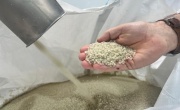New trade association for the biochemical sector to launch
Members of the biochemical sector are being asked to attend an event on 10 February to help develop a new trade association for the bioeconomy, the British Association of Biobased and Biodegradable Chemicals (BABBC).
Bioeconomy background
According to the House of Lords Science and Technology Committee’s report ‘Waste or resource? Stimulating a bioeconomy’, the potential economic market value of the bioeconomy in the UK is around £100 billion. The bioeconomy is defined as ‘the use of biological feedstocks to generate economic outputs in the form of energy, materials or chemicals’, and it is estimated that around £6 billion of the £60 billion UK chemical industry could be replaced with renewable biochemicals (such as those produced from waste materials) if the bioeconomy were further developed.
Other potential benefits of developing a bioeconomy include: boosting sustainable practices in business; creating jobs; making use of brownfield sites (through facility construction); and enabling the UK to export new products that are currently imported (for example, compostable packaging).
However, the committee concluded that although there are ‘promising signs that a waste-based bioeconomy could deliver substantial economic returns and support a considerable number of jobs… there is clearly uncertainty in these predictions’. Consequently, it argued that ‘government, industry and academia should take steps to further characterise this opportunity and ensure its full potential is realised’.
Bringing about the ‘full potential’ of the UK’s bioeconomy

As such, the President of the International Solid Waste Association (ISWA), David Newman, and the Chief Technical Officer of bioeconomy investment firm Sinvestec LLC, John Wiliams, are inviting members of the industry to attend an event next Tuesday (10 February) to develop the BABBC, which will be a trade association to help bring about the ‘full potential’ of the UK’s bioeconomy.
Speaking to Resource, Newman said: “In the UK presently there is not a specific trade association representing the views of biopolymer producers and their value chainwhen the issues around bioplastics in specific, and biochemistry in general, are discussed in public and political contexts… Although investments in biopolymer production are being made in the UK, they are relatively small when compared to investments being made elsewhere (i.e. Italy, USA, and Germany). In fact, during 2014, investments in the Italian bioeconomy amounted to around €500 million [£379 million], creating 500 new jobs.”
Williams added that the UK is suffering from a lack of investment in the new bioeconomy due to a lack of cohesion. He said: “The majority of potential investors don’t know the biochemical industry, and many see the sector to be too risky to enter, because everyone is doing something slightly different and there is no coherent message.
“The connection between different areas – such as academia, technology, investors, et cetera – has been very slow in getting translated into anything commercial and connected in this country. The technologies are there, but they are a little fractured.
“It’s glaringly obvious to me that high-value chemicals, platform chemicals and biomaterials are a parallel stream to petrochemicals, but we should be exploiting this far quicker and much more effectively than we are at the moment. This is why we need a trade association, because it can drive the commercial aspect, lobby the government for support, and access the inside channels on any standards that may be required. We need this voice to provide support for and involvement in the sector.”
The British Association of Biobased and Biodegradable Chemicals
The BABBC is being established to be the ‘leading body for the biobased and biodegradable chemicals industry in the United Kingdom’.
It is expected that the BABBC will:
- promote the appropriate use of biobased and biodegradable chemicals through participation in development of standards, legislation, regulations, material guides and positive community interaction;
- act as the communication focal point for media, government, non-government organisations (NGOs), environmental organisations, industry stakeholders and the public, on issues and education relative to biobased and biodegradable chemicals;
- educate and promote public awareness of biobased and biodegradable chemicals as available alternatives to conventional chemicals and to promote the use of these products;
- administer and uphold a code of conduct that will be executed by all members of the association;
- promote scientific, economic and social research into the development of products, applications, and systems deriving from and using biobased and biodegradable chemicals;
- represent manufacturers, converters, wholesalers, distributors, end users, consumers and processors of biobased and biodegradable chemicals (in conjunction with other associations or entities) in consideration of appropriate end-of-life design for products or materials;
- accurately portray the characteristics and benefits of the family of chemical products, which are biodegradable and biobased;
- provide ‘informed and considered information’ on behalf of members to genuine correspondents for the development of specific marketplaces;
- promote certification programmes for consumer and business-to-business market recognition of products derived from biobased and biodegradable chemicals; and
- not engage in any anti-competitive activities or to in anyway way breach the appropriate or relevant provisions of any anti-competition local, national or European regulations and practices.
The kick-off meeting takes place on Tuesday, 10 February, at 1.30pm at the Society of Biology in London. It is open to “anybody who is involved in speciality chemicals and commodity chemicals, composites, plastics, polymers, even construction materials”, and will involve discussing the development of the trade association and what direction it should take.
Attendance is by invitation only. Those wishing to attend, or seeking further details should email David Newman on [email protected]
Read the 'Waste or resource? Stimulating a bioeconomy' report, or find out more about European action on the bioeconomy.




